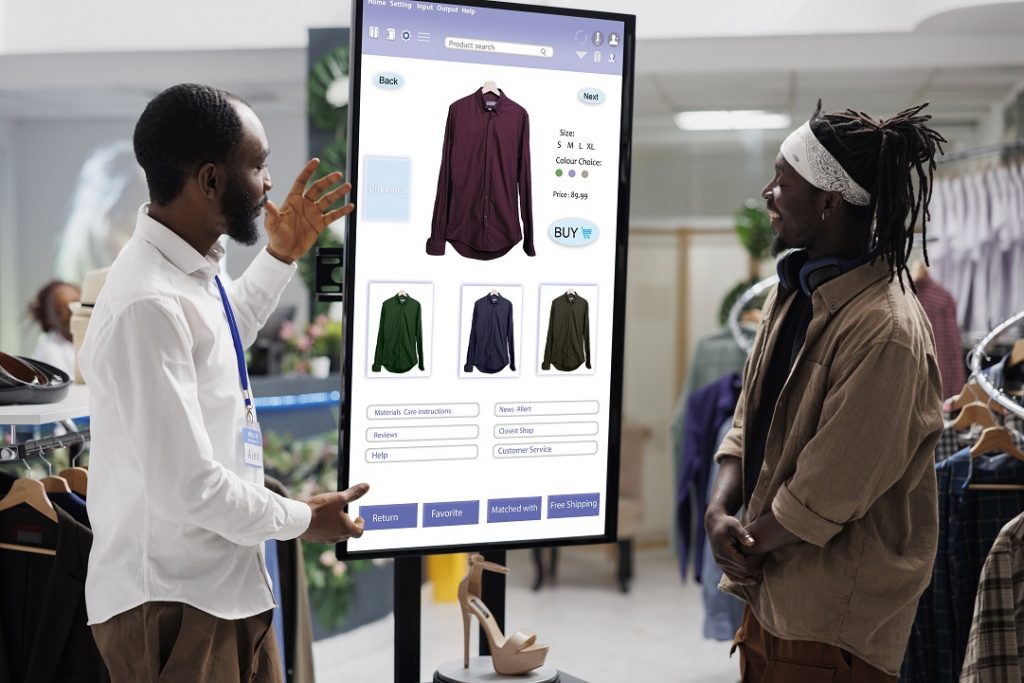At Edunetix, our mission is to revolutionize industries through cutting-edge AI solutions. Whether it’s enhancing learning experiences in educational institutions, improving customer service in banking, or optimizing operations in healthcare, our tailored AI strategies deliver impactful results. Join us in shaping the future with intelligent solutions that drive success.
Introduction
Artificial Intelligence (AI) has emerged as a transformative force across various industries, driving innovation, efficiency, and growth. At Edunetix, we leverage AI to revolutionize sectors such as education, banking, and healthcare. Our bespoke AI strategies are designed to address unique industry challenges and deliver measurable outcomes.

Enhancing Learning Experiences in Educational Institutions
The education sector has witnessed a significant transformation with the integration of AI technologies. AI-powered tools and platforms are redefining the learning experience, making it more personalized, interactive, and effective.
Personalized Learning: AI algorithms analyze student data to provide personalized learning experiences. These algorithms adapt to individual learning styles and paces, ensuring that each student receives the support they need. For example, platforms like Carnegie Learning use AI to create customized learning paths for students, improving their engagement and outcomes [1].
Intelligent Tutoring Systems: AI-powered tutoring systems provide real-time feedback and assistance to students. These systems can identify areas where students struggle and offer targeted interventions. One such example is the AI-driven platform, Knewton, which delivers personalized content recommendations based on student performance [2].
Automated Administrative Tasks: AI also streamlines administrative tasks, allowing educators to focus more on teaching. Automated grading systems, for instance, can grade assignments and exams with high accuracy and speed. Turnitin, an AI-based tool, not only checks for plagiarism but also provides feedback on grammar and writing quality [3].

Improving Customer Service in Banking
The banking industry has embraced AI to enhance customer service, streamline operations, and mitigate risks. AI-driven solutions are transforming how banks interact with customers and manage their processes.
Chatbots and Virtual Assistants: AI-powered chatbots and virtual assistants provide 24/7 customer support, answering queries, and performing tasks such as balance inquiries, fund transfers, and loan applications. Bank of America’s Erica is a prime example of an AI-driven virtual assistant that helps customers with various banking needs [4].
Fraud Detection: AI algorithms are adept at detecting fraudulent activities by analyzing transaction patterns and identifying anomalies. These systems can alert banks to suspicious activities in real-time, reducing the risk of fraud. For instance, JP Morgan Chase uses AI to monitor transactions and prevent fraud [5].
Personalized Financial Services: AI helps banks offer personalized financial services based on customer data and behavior. This includes tailored investment advice, customized loan offers, and personalized savings plans. Wealthfront, an AI-driven robo-advisor, provides personalized investment recommendations to clients [6].

Optimizing Operations in Healthcare
AI is playing a crucial role in transforming healthcare by enhancing diagnostics, treatment planning, and operational efficiency. AI-powered solutions are helping healthcare providers deliver better patient care and optimize their operations.
Medical Imaging and Diagnostics: AI algorithms analyze medical images with high accuracy, assisting radiologists in diagnosing conditions such as cancer, heart disease, and neurological disorders. IBM’s Watson for Oncology, for example, uses AI to analyze medical literature and patient data to recommend treatment options [7].
Predictive Analytics: AI-powered predictive analytics help healthcare providers anticipate patient needs and manage resources more effectively. For instance, AI can predict patient admissions, allowing hospitals to optimize staffing and bed allocation. The Mayo Clinic uses AI to predict patient outcomes and improve care [8].
Operational Efficiency: AI streamlines administrative tasks and optimizes operations in healthcare facilities. This includes automating scheduling, managing patient records, and optimizing supply chain management. Olive, an AI-driven automation platform, helps healthcare providers reduce administrative burden and improve operational efficiency [9].

AI in Manufacturing
AI is revolutionizing the manufacturing sector by enhancing production processes, improving quality control, and driving innovation.
Predictive Maintenance: AI algorithms analyze data from machinery and equipment to predict failures before they occur. This helps manufacturers perform maintenance proactively, reducing downtime and maintenance costs. General Electric (GE) uses AI for predictive maintenance to optimize its operations [10].
Quality Control: AI-powered computer vision systems inspect products for defects with high precision. These systems can detect even the smallest imperfections, ensuring high-quality products. Fanuc, a leading robotics company, uses AI-driven computer vision for quality control in manufacturing [11].
Supply Chain Optimization: AI enhances supply chain management by predicting demand, optimizing inventory, and reducing costs. IBM’s AI-driven supply chain solutions help manufacturers improve efficiency and resilience [12].

AI in Retail
The retail industry is leveraging AI to enhance customer experiences, optimize operations, and drive sales.
Personalized Shopping Experiences: AI analyzes customer data to provide personalized product recommendations and offers. Amazon’s recommendation engine, powered by AI, drives a significant portion of its sales by suggesting products based on customer behavior [13].
Inventory Management: AI helps retailers manage inventory more efficiently by predicting demand and optimizing stock levels. Walmart uses AI to manage its inventory, ensuring that products are available when customers need them [14].
Customer Service: AI-powered chatbots and virtual assistants provide instant customer support, answering queries and assisting with purchases. Sephora’s AI-driven virtual assistant helps customers find the right products based on their preferences [15].

AI in Transportation and Logistics
AI is transforming the transportation and logistics sector by improving efficiency, reducing costs, and enhancing safety.
Autonomous Vehicles: AI is at the core of autonomous vehicle technology, enabling self-driving cars to navigate and make decisions in real-time. Tesla’s Autopilot, an AI-driven system, allows for semi-autonomous driving, improving safety and efficiency [16].
Route Optimization: AI algorithms analyze traffic patterns and other data to optimize delivery routes, reducing fuel consumption and delivery times. UPS uses AI for route optimization, saving millions of miles and gallons of fuel annually [17].
Predictive Maintenance: Similar to manufacturing, AI in transportation predicts maintenance needs for vehicles, reducing downtime and maintenance costs. Delta Airlines uses AI to predict aircraft maintenance needs, ensuring higher operational efficiency [18].

Conclusion
At Edunetix, we are committed to harnessing the power of AI to revolutionize industries and drive success. Our tailored AI solutions address unique challenges and deliver impactful results across education, banking, healthcare, manufacturing, retail, and transportation. Join us in shaping the future with intelligent solutions that pave the way for innovation and growth.
Call to Action:
- Are you interested in partnering or piloting our technology? Contact us at info@edunetix.co
- Want to learn more about our initiatives for diversity and inclusion? Visit our website at www.edunetix.co
- Share this blog post to help spread the message of building a more inclusive future of work!
References
[1] Carnegie Learning. (n.d.). Retrieved from https://www.carnegielearning.com/ [2] Knewton. (n.d.). Retrieved from https://www.knewton.com/ [3] Turnitin. (n.d.). Retrieved from https://www.turnitin.com/ [4] Bank of America. (n.d.). Retrieved from https://www.bankofamerica.com/ [5] JP Morgan Chase. (n.d.). Retrieved from https://www.jpmorganchase.com/ [6] Wealthfront. (n.d.). Retrieved from https://www.wealthfront.com/ [7] IBM Watson for Oncology. (n.d.). Retrieved from https://www.ibm.com/watson/health/oncology/ [8] Mayo Clinic. (n.d.). Retrieved from https://www.mayoclinic.org/ [9] Olive. (n.d.). Retrieved from https://oliveai.com/ [10] General Electric. (n.d.). Retrieved from https://www.ge.com/ [11] Fanuc. (n.d.). Retrieved from https://www.fanuc.com/ [12] IBM Supply Chain. (n.d.). Retrieved from https://www.ibm.com/supply-chain [13] Amazon. (n.d.). Retrieved from https://www.amazon.com/ [14] Walmart. (n.d.). Retrieved from https://www.walmart.com/ [15] Sephora Virtual Assistant. (n.d.). Retrieved from https://www.sephora.com/ [16] Tesla Autopilot. (n.d.). Retrieved from https://www.tesla.com/autopilot [17] UPS. (n.d.). Retrieved from https://www.ups.com/ [18] Delta Airlines. (n.d.). Retrieved from https://www.delta.com/




